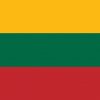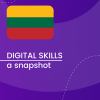Lithuania - Industry Digitisation Roadmap 2019-2030
The Lithuanian Industry Digitisation Roadmap 2019-2030 sets the goal that Digital competences and skills must be developed to assist companies in creation, adoption and implementation of digitisation solutions.
The Lithuanian Industry Digitisation 2019-2030 Roadmap defines several priorities, which all work together to contribute to the development of digital competences for all. These include the provision of digital and high tech skills for labour force in Lithuania, especially in the context of the industry sector, as well as actions aiming to balance the state of the labour markets and bridge discrepancies between education and industry needs, to increase the number of employees working in high-tech companies, and to improve access to a variety of specialists demanded by industry.
The Roadmap sets 4 main pillars to digitalisation of Industry in Lithuania:
- Knowledge - considers technologies and business models that will become integrated through value chains.
- People - refers to policy-makers, researchers and creators, enablers, and intermediaries that will play a critical role in the digitisation of industry along the private sector and investors.
- Infrastructure - regards services infrastructure, demonstration infrastructure, and R&D infrastructure which, when combined, will provide the best possible conditions for manufacturing innovation.
- Environment - concerns the legal and regulatory environment, standards, and incentives system that will embed industry in a smoothly performing facilitation network within the local ecosystem.
Strategy Details
Activities will be financed by EU Structural Funds .
Industry and government experts involved. Supported by the Lithuanian Innovation Center and InTechCentras, in cooperation with the European Commission’s Structural Reform Support Service (SRSS).




